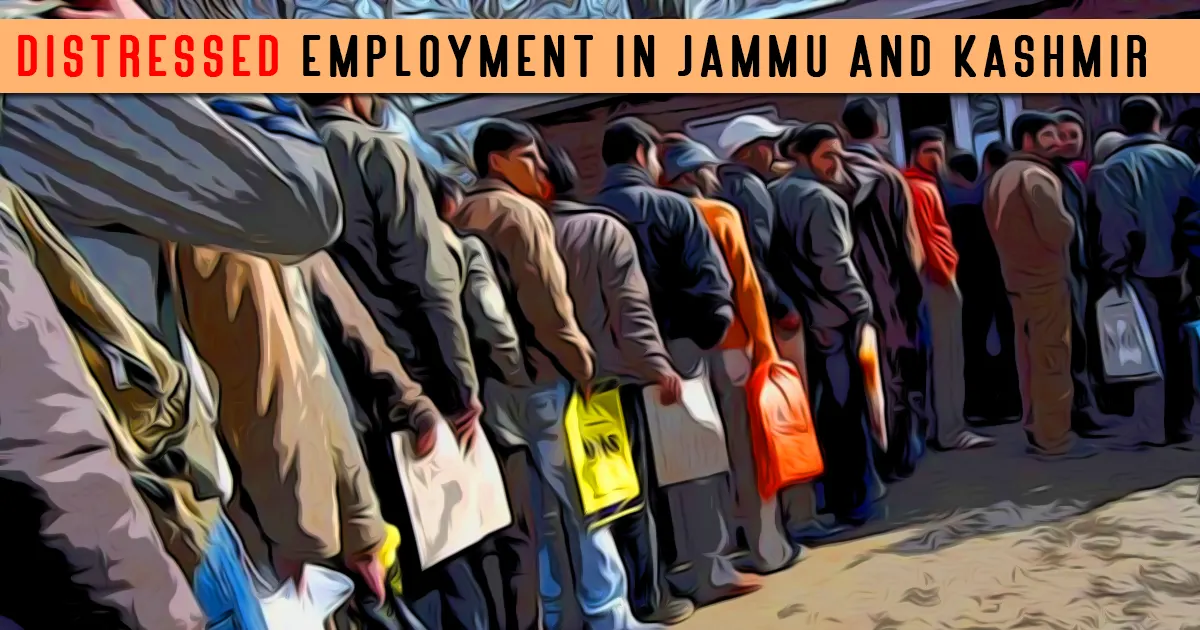GS – 2 – Economy

Distressed employment refers to a situation where individuals are forced to accept low-paying, insecure, and informal jobs due to economic, social, or political distress. In Jammu and Kashmir (J&K), the issue is exacerbated by several factors including political instability, lack of industrialization, skill gaps, and regional challenges.

Key Factors Contributing to Distressed Employment in J&K
- Political Instability and Conflict:
- Decades of conflict and insurgency have disrupted economic activities.
- Investment opportunities remain low due to security concerns.
- Frequent strikes, curfews, and internet shutdowns affect businesses and employment.
- Agriculture Dependency:
- A significant portion of the population depends on subsistence agriculture.
- Limited land holdings and low productivity lead to disguised unemployment.
- Lack of Industrialization:
- J&K lacks major industries to absorb the skilled and semi-skilled workforce.
- Infrastructure deficits hinder industrial growth and job creation.
- Skill Gaps and Education Deficiencies:
- Mismatch between available jobs and the skillsets of youth contributes to underemployment.
- Quality of education and vocational training remains subpar, limiting employability.
- Seasonal Employment:
- Heavy reliance on horticulture, tourism, and handicrafts creates seasonal employment cycles.
- During off-seasons, many workers face joblessness or migrate for informal labor.
- High Unemployment Rates:
- The unemployment rate in J&K is among the highest in India.
- Youth unemployment is particularly alarming, leading to distress migration.
- Informal Sector Dominance:
- A large percentage of employment is in the informal sector.
- Workers lack job security, social protection, and fair wages.
- Tourism Sector Volatility:
- J&K’s economy depends heavily on tourism, which is highly sensitive to political unrest and natural disruptions.
- Instability often results in abrupt declines in tourist inflows, affecting livelihoods.
Impact of Distressed Employment
- Poverty and Inequality:
- Low wages and insecure jobs keep families trapped in poverty.
- Socioeconomic inequalities widen across regions.
- Youth Frustration:
- High unemployment among the educated youth increases frustration and social unrest.
- Some youths may be vulnerable to radicalization or illegal activities.
- Distress Migration:
- Migration to other states for low-paying informal work is common, leading to family disruptions.
- Social Issues:
- Economic distress aggravates mental health issues, substance abuse, and family breakdowns.
- Economic Stagnation:
- Low productivity and joblessness slow down overall economic growth in J&K.
Government Initiatives to Address Employment Issues in J&K
- Prime Minister’s Development Package (PMDP):
- Launched in 2015, focusing on infrastructure development, employment generation, and economic revival.
- Mission Youth Initiative:
- Aimed at empowering the youth through skill development, entrepreneurship, and job placement programs.
- Back to Village (B2V) Programme:
- Focus on rural development and livelihood opportunities at the grassroots level.
- Skill Development Programs:
- Programs like PMKVY (Pradhan Mantri Kaushal Vikas Yojana) provide skill training for unemployed youth.
- Employment Schemes:
- Initiatives like MGNREGA provide wage employment in rural areas.
- Tourism Development Initiatives:
- Efforts to promote sustainable tourism to generate employment and income.
- Industrial Policy for J&K:
- Incentives and subsidies to attract industrial investments for job creation.
Way Forward
- Promotion of Entrepreneurship:
- Provide financial support, mentorship, and market linkages to encourage youth startups.
- Skill Development and Education:
- Introduce vocational training programs aligned with industry needs.
- Improve the quality of education and digital literacy.
- Diversification of Economy:
- Develop sectors like IT, renewable energy, and manufacturing to generate sustainable jobs.
- Support for Traditional Industries:
- Modernize sectors like handicrafts, horticulture, and sericulture to improve productivity and income.
- Peace and Stability:
- Political stability and confidence-building measures are essential to attract investments and foster development.
- Infrastructure Development:
- Invest in roads, power, and internet connectivity to boost industrialization and tourism.
- Women Empowerment:
- Promote women’s participation in the workforce through self-help groups and skill-based employment.
- Tourism Revival:
- Focus on promoting eco-tourism, adventure tourism, and year-round activities to reduce seasonality.
Addressing distressed employment in Jammu and Kashmir requires a multi-pronged strategy that promotes peace, economic diversification, skill development, and infrastructure growth. By creating sustainable livelihood opportunities, the region can overcome economic challenges and unlock its full potential.




